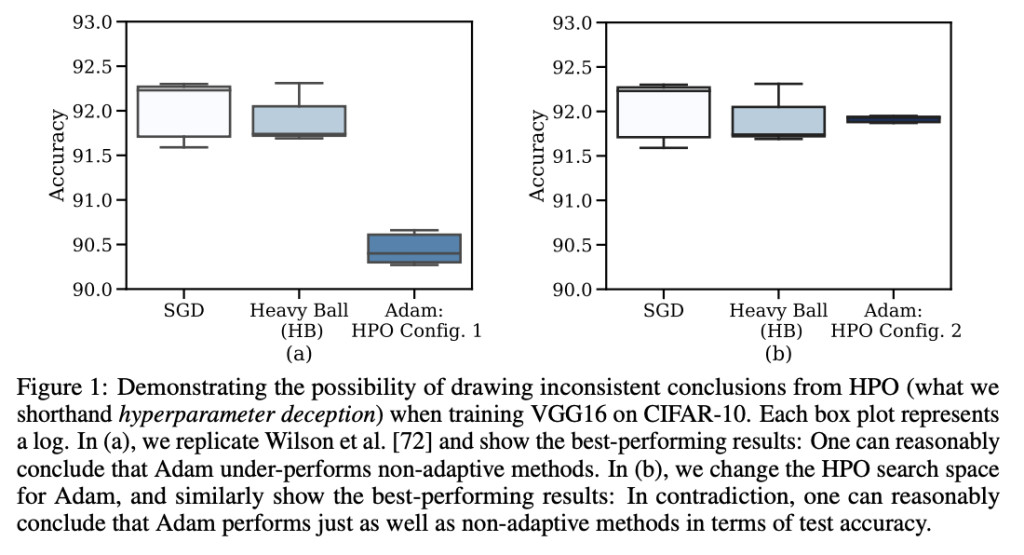Machine learning has revolutionized various fields, offering powerful tools for data analysis and predictive modeling. Central to these models’ success is hyperparameter optimization (HPO), where the parameters that govern the learning process are tuned to achieve the best possible performance. HPO involves selecting hyperparameter values such as learning rates, regularization coefficients, and network architectures. These are not directly learned from the data but significantly impact the model’s ability to generalize to new, unseen data. The process is often computationally intensive, as it requires evaluating many different configurations to find the optimal settings that minimize the error on validation data.
A persistent challenge in the machine learning community is the problem of hyperparameter deception. This issue arises when the conclusions drawn from comparing different machine learning algorithms depend heavily on the specific hyperparameter configurations used during HPO. Researchers often find that by searching one subset of hyperparameters, they might conclude that one algorithm outperforms another while searching a different subset might lead to the opposite conclusion. This problem needs to be revised regarding the reliability of empirical results in machine learning, as it suggests that the performance comparisons may be influenced more by the choice of hyperparameters than by the inherent capabilities of the algorithms themselves.
Traditional methods for HPO, such as grid and random search, involve systematically or randomly exploring the hyperparameter space. Grid search tests every possible combination of a predefined set of hyperparameter values, while random search samples configurations from specified distributions. However, both methods can be ad-hoc and resource-intensive. They need a theoretical foundation to ensure their results are reliable and not subject to hyperparameter deception. As a result, the conclusions drawn from such methods may not accurately reflect the true performance of the algorithms under consideration.
Researchers from Cornell University and Brown University have introduced a novel approach called epistemic hyperparameter optimization (EHPO). This framework aims to provide a more rigorous and reliable process for concluding HPO by formally accounting for the uncertainty associated with hyperparameter choices. The researchers developed a logical framework based on modal logic to reason about the uncertainty in HPO and how it can lead to deceptive conclusions. By doing so, given a limited computational budget, they created a defended variant of random search, which they theoretically proved resistant to hyperparameter deception.
The EHPO framework works by constructing a model that simulates different possible outcomes of HPO under varying hyperparameter configurations. By analyzing these outcomes, the framework ensures that the conclusions drawn are robust to the choice of hyperparameters. This method effectively guards against the possibility that the results of HPO are due to lucky or coincidental choices of hyperparameters rather than genuine algorithmic superiority. The researchers demonstrated this approach’s utility by validating it theoretically and empirically, showing that it can consistently avoid the pitfalls of traditional HPO methods.
In their empirical evaluations, the researchers conducted experiments using well-known machine learning models and datasets to test the effectiveness of their defended random search EHPO. They found that the traditional grid search method could lead to misleading conclusions, where the performance of adaptive optimizers like Adam appeared to be worse than non-adaptive methods like SGD. However, their defended random search approach showed that these discrepancies could be resolved, leading to more consistent and reliable conclusions. For instance, when the defended random search was applied to the VGG16 model trained on the CIFAR-10 dataset, it was found that Adam, under properly tuned hyperparameters, performed comparably to SGD, with test accuracy results that did not significantly differ between the two, contradicting earlier results that suggested otherwise.
To conclude, the research highlights the importance of rigorous methodologies in HPO to ensure the reliability of machine learning research. The introduction of EHPO marks a significant advancement in the field, offering a theoretically sound and empirically validated approach to overcoming the challenges of hyperparameter deception. By adopting this framework, researchers can have greater confidence in their conclusions from HPO, leading to more robust and trustworthy machine learning models. The study underscores the need for the machine learning community to adopt more rigorous practices in HPO to advance the field and ensure that the developed models are effective and reliable.
Check out the Paper. All credit for this research goes to the researchers of this project. Also, don’t forget to follow us on Twitter and LinkedIn. Join our Telegram Channel. If you like our work, you will love our newsletter..
Don’t Forget to join our 50k+ ML SubReddit
The post This AI Paper from Cornell and Brown University Introduces Epistemic Hyperparameter Optimization: A Defended Random Search Approach to Combat Hyperparameter Deception appeared first on MarkTechPost.
Source: Read MoreÂ

